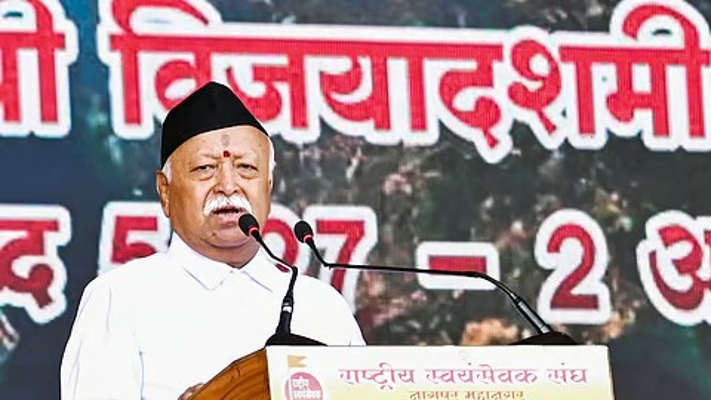
STATE TIMES NEWS
NAGPUR: Rashtriya Swayamsevak Sangh (RSS) chief Mohan Bhagwat on Thursday said the inherent strength and character of Hindu society guarantee national unity and development, asserting that it is an inclusive force free from the divisive mentality of “us and them.”
Addressing the annual Vijayadashmi rally in Nagpur, which marked the organisation’s centenary, he said global interdependence shouldn’t become a compulsion and there is no substitute for `swavalamban’ (self-reliance).
The RSS chief also called for increasing security capabilities, stating that the international response to the Pahalgam terror attack showed the true nature of India’s global friendships.
Speaking on a wide-range of issues at the function attended by former president Ram Nath Kovind as chief guest, he called for harmonious and respectful attitudes toward each other, urging citizens not to disrespect the beliefs, icons, or places of worship of others.
He called the Hindu society an inclusive society that is and will remain free from the “us and them” mentality.
“The Hindu society is upholder and guardian of the noble idea of ‘Vasudhaiva Kutumbakam’ (the world is one family),” Bhagwat said.
Social unity is the most important factor in a nation’s progress, particularly in India, which is defined by immense diversity-multiple languages, religions, and lifestyles, including those who entered centuries ago and accepted new faiths, he said. “According to Bharatiya traditions, all are welcome….We look at them as ours rather than as the ‘other’.”
But distinct identities “should not cause division,” he said, stressing that the larger identity-as society, a country, culture and nation-is supreme.
He condemned the tendency to “take the law into one’s hands” or engage in violence for trivial reasons.
A “show of strength is deliberately done to provoke a particular community” and falling into such traps has evil consequences, he warned.
Stressing that the government should operate in accordance with law and without bias, Bhagwat called for the “good people of society” and younger generation to remain vigilant, intervening when necessary to maintain social order.
Bhagwat noted that the international response to the Pahalgam terror attack showed the true nature of India’s friendships.
The attack on April 22, where cross-border terrorists killed 26 “Bharatiya” civilian tourists after specifically asking about their Hindu faith, “led to to a wave of grief, sadness and anger across Bharat,” he said.
He praised the government for delivering a “fitting response” which showcased the firmness of the leadership, valour of the armed forces, and determination and unity of society.
The Sarsanghchalak asserted that the episode made it evident that the country “must remain as vigilant as possible and further develop our security capabilities.”
The responses of other countries were a test of “who our friends are in the global arena and to what extent they are willing to stand by us.”
Bhagwat also expressed deep concern over the “turmoil” in neighbouring countries.
He identified the immediate causes of this discontent as “disconnect between the government and society and lack of able and people-oriented administrators.”
However, he asserted that violent outbursts do not have the power to bring about the desirable change, and if transformation is not achieved through democratic means, “dominant powers of the world try to find opportunities to play their own games”.
“The regime change in Sri Lanka, Bangladesh, and more recently Nepal due to violent outburst of public anger is a concern for us. The forces wanting to create such disturbances in Bharat are active inside as well as outside our country,” he said.
“Peace, stability, prosperity, and ensuring comfort and wellbeing in these countries is a necessity arising out of our natural affinity with them, going beyond the consideration for protection of our interests,” he said.
On economy, Bhagwat said there is no substitute for ‘swadeshi’ (use of indigenous resources) and ‘swavalamban’.
Bhagwat cautioned that flaws in the global economic system are being exposed, including the widening gap between rich and poor, concentration of economic power, environmental degradation, and growth of transactionalism over genuine relationships
“We will need to reconsider our approach on some issues to ensure that these flaws and the tariff policy adopted by America, based solely on its self-interest, do not pose a challenge for us.
“The world operates through mutual interdependence. By becoming Aatmanirbhar and being cognizant of global unity, we must ensure that this global interdependence does not become a compulsion for us, and we are able to act according to our own will,” he added.
On environment, he said the harmful consequences of the global “materialist and consumerist development model” are becoming evident. The current development model, based on a “materialist and compartmentalised approach,” is directly linked to recent ecological disasters, he said.
Himalayas are facing intensified adverse effects including
unpredictable rainfall, landslides and drying glaciers, he said, noting that the entire water supply of south Asia originates in the region.

